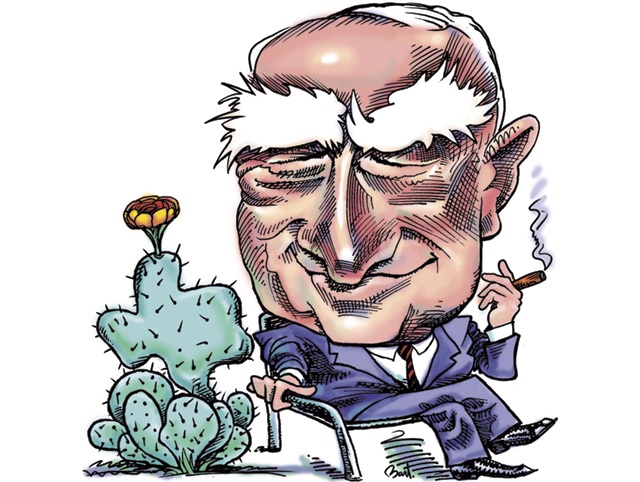The first U.S. vice president from Texas was a gruff, outspoken career politician who spent much of his life in Washington. Historians consider him perhaps the most influential vice president ever, but he had such disdain for the office he is famous for saying it ‘is not worth a bucket of warm spit’—though there seems to be some uncertainty about exactly how he put it.
How is it, then, that most people, even Texans, probably don’t know John Nance Garner? After all, he earned the colorful nickname Cactus Jack as a Texas legislator and became the catalyst for pushing President Franklin Roosevelt’s New Deal through Congress in the 1930s.
Patrick Cox, a Texas historian and vice president of the Pedernales Electric Cooperative board of directors, said the vice presidency received little media attention back then. “There wasn’t extensive media coverage of politics and political personalities,” said Cox, who has researched Garner’s life. “The current generation of political leaders has more exposure to the media.”
Garner, born in 1868 near Detroit, Texas, attended law school at Vanderbilt University but never finished. After returning to Texas, Garner worked to pass the bar and set up a law office in Uvalde.
“In that era, it was not uncommon to ‘read for the law’ and work as a clerk in a law office until you could pass the bar,” Cox said. Garner was elected county judge in 1893 and then state representative in 1898.
He didn’t say much in his three years in the Legislature, preferring to stay focused on his work rather than controversial issues, although one bill landed Garner attention and permanent acclaim. Garner campaigned for the cactus bloom to be the state flower of Texas, but it, of course, lost to the bluebonnet.
That saddled Garner with the lifelong moniker Cactus Jack, which Cox said Garner enjoyed. “He was known for having a prickly personality, with a sharp wit and sharp tongue,” Cox said.
While in the Legislature, he established the 15th Congressional District, which covered from Corpus Christi south to Brownsville and west to Del Rio. He then ran for Congress in the 15th and won. Garner served as its representative for 15 terms, 1903-33.
Garner understood that influence came with seniority, so he used his years in office to build affiliations with prominent members of Congress. He was elected Speaker of the House in 1931, and it was during that term that he decided to run for president. After failing to secure the Democratic nomination in 1932, Garner pulled out of the race and became Roosevelt’s running mate.
Garner called the vice presidency the “spare tire of government” and “almost wholly unimportant,” Cox said. Garner even remarked, “When I was elected vice president of the United States, it was the worst thing that ever happened to me.” But while he was in office, Garner revolutionized the position from figurehead to vital member of the executive branch.
He played a role in major New Deal accomplishments, including the Rural Electrification Act of 1936, which led to the creation of rural cooperatives. In Texas, 2 percent of farms had electricity in 1936; by 1965, only 2 percent of farms were without power, according to the Texas State Historical Association.
Garner declined to be FDR’s running mate for a second re-election. He retired from politics and moved back to Uvalde. His time as vice president earned him respect from other Southern Democrats, and his birthday was an occasion for Democrats to get together and celebrate. “Harry Truman, Lyndon Johnson, Sam Rayburn and Dolph Briscoe were known to attend,” Cox said.
In 1960, when Johnson was deliberating whether to become John Kennedy’s running mate, he called Garner for advice. Garner said, “I’ll tell you, Lyndon, the vice presidency isn’t worth a pitcher of warm spit.” Johnson joined the ticket anyway and became the second vice president from Texas.
While Kennedy was on his tour of Texas, he called the former vice president, who turned 95 on November 22, 1963, to wish him a happy birthday. Newspapers reported that directly after Kennedy made the call, he left his Fort Worth hotel for the parade through Dallas, where he was assassinated.
Garner died November 7, 1967, 15 days before turning 99. His home was converted into the John Nance Garner Museum. Garner State Park and Garner Field, an airport, are named for him.
Cactus Jack went to Washington with a simple goal—get elected, stay there and gain influence through seniority—but became the vice president who made things happen.
“The irony is Garner was so critical of the position, but he actually transformed the office into the modern-day vice presidency,” Cox said.
——————–
Brittany Lamas, Texas Co-op Power editorial intern


